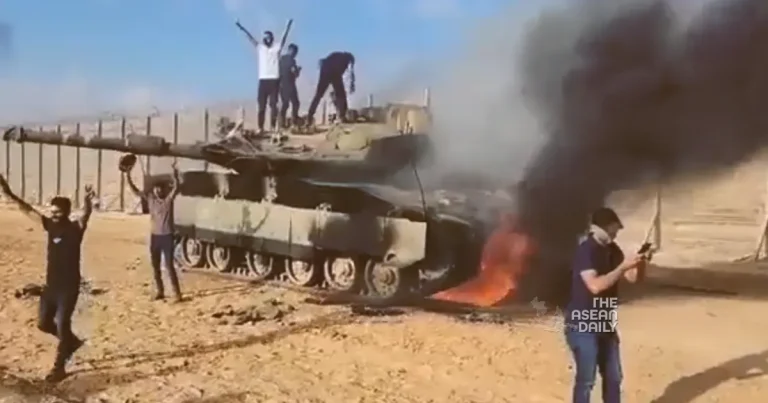8-10-2023 (JERUSALEM) Gaza’s militant Hamas rulers launched a multi-pronged attack on Israel on Saturday. The attack came by air, land, and sea, leaving millions of Israelis in the south awoken by the jarring sound of incoming rockets and the ominous thud of their impact. Air raid sirens blared as far north as Tel Aviv, while Israel’s anti-rocket interceptors roared to life in Jerusalem.
What unfolded was an unprecedented escalation, with Hamas fighters breaching Israel’s heavily fortified separation fence and entering Israeli communities along the Gaza border. This event sent shockwaves through Israel and left its leaders scrambling to respond.
Within a mere nine hours, the conflict had resulted in approximately 40 Israeli casualties and nearly 200 Palestinian deaths, with these figures expected to rise. Here are some key takeaways from this rapidly changing and deeply unsettling situation.
ISRAEL CAUGHT UNAWARE
The surprise attack on Saturday was reminiscent of the 1973 Mideast war, during which a sudden, full-scale Egyptian-Syrian assault on a Jewish holiday caught the unprepared Israeli military off guard. Israelis had long assumed that their intelligence services would detect and alert the army to any significant attacks or invasions in advance. The failure to do so in this case has raised questions about Israeli intelligence and preparedness.
As the government faces criticism for its perceived lack of action, and the casualty count climbs, Prime Minister Benjamin Netanyahu’s leadership is at stake, with some even suggesting he may lose control of the government and the country.
UNPRECEDENTED INFILTRATION
Hamas claimed its fighters had captured several Israelis, releasing gruesome videos that showed militants dragging bloodied soldiers and standing over dead bodies, some of whom were stripped to their underwear. These images revived memories of the 2006 capture of soldier Gilad Shalit, who was held by Hamas-linked militants for five years until his release in exchange for over 1,000 Palestinian prisoners.
In a dramatic escalation, Hamas also deployed paragliders into Israel, marking an audacious attack reminiscent of a famous assault in the late 1980s when Palestinian militants crossed from Lebanon into northern Israel on hang-gliders, killing six Israeli soldiers. While the Israeli army confirmed that soldiers and civilians had been taken hostage in Gaza, it provided no further details.
A DANGEROUS GAMBLE BY HAMAS
Hamas has cited various sources of tension between Israel and the Palestinians, including disputes over the sensitive Al-Aqsa Mosque compound, a site sacred to both Muslims and Jews. Competing claims over the compound have led to violence in the past, including the 11-day war between Israel and Hamas in 2021.
In recent years, Israeli religious nationalists have increased their visits to the compound, sparking condemnations and accusations from Hamas. Tensions have also risen due to violent Palestinian protests along the Gaza border, with Hamas seeking Israeli concessions to ease the 17-year blockade on the enclave.
Hamas’ attack could also be linked to ongoing US-brokered talks on the normalization of ties between Israel and Saudi Arabia. However, reports have so far focused on concessions to Palestinians in the West Bank, not Gaza.
ISRAEL IN CRISIS
The eruption of violence in Israel coincides with the largest protests in the country’s history over Prime Minister Netanyahu’s proposal to weaken the Supreme Court. These protests, driven by concerns about a power grab by Netanyahu, have divided Israeli society and disrupted the military.
Hundreds of reservists have threatened to stop volunteering for duty in protest of the judicial overhaul. These developments have raised concerns about the military’s cohesion and operational readiness.
In response, Netanyahu called up an extensive mobilization of reserve forces, further illustrating the turmoil within the Israeli military.
A PERILOUS CYCLE
Israel and Hamas have engaged in four wars and multiple exchanges of fire since 2007. Cease-fires have temporarily halted major fighting in the past, but these agreements have often proven fragile.
The deeper, underlying issues of the Israeli-Palestinian conflict are rarely addressed, setting the stage for future rounds of violence. With increased leverage in this latest conflict, Hamas is likely to push harder for concessions, including easing the blockade and securing the release of Palestinian prisoners held by Israel.




